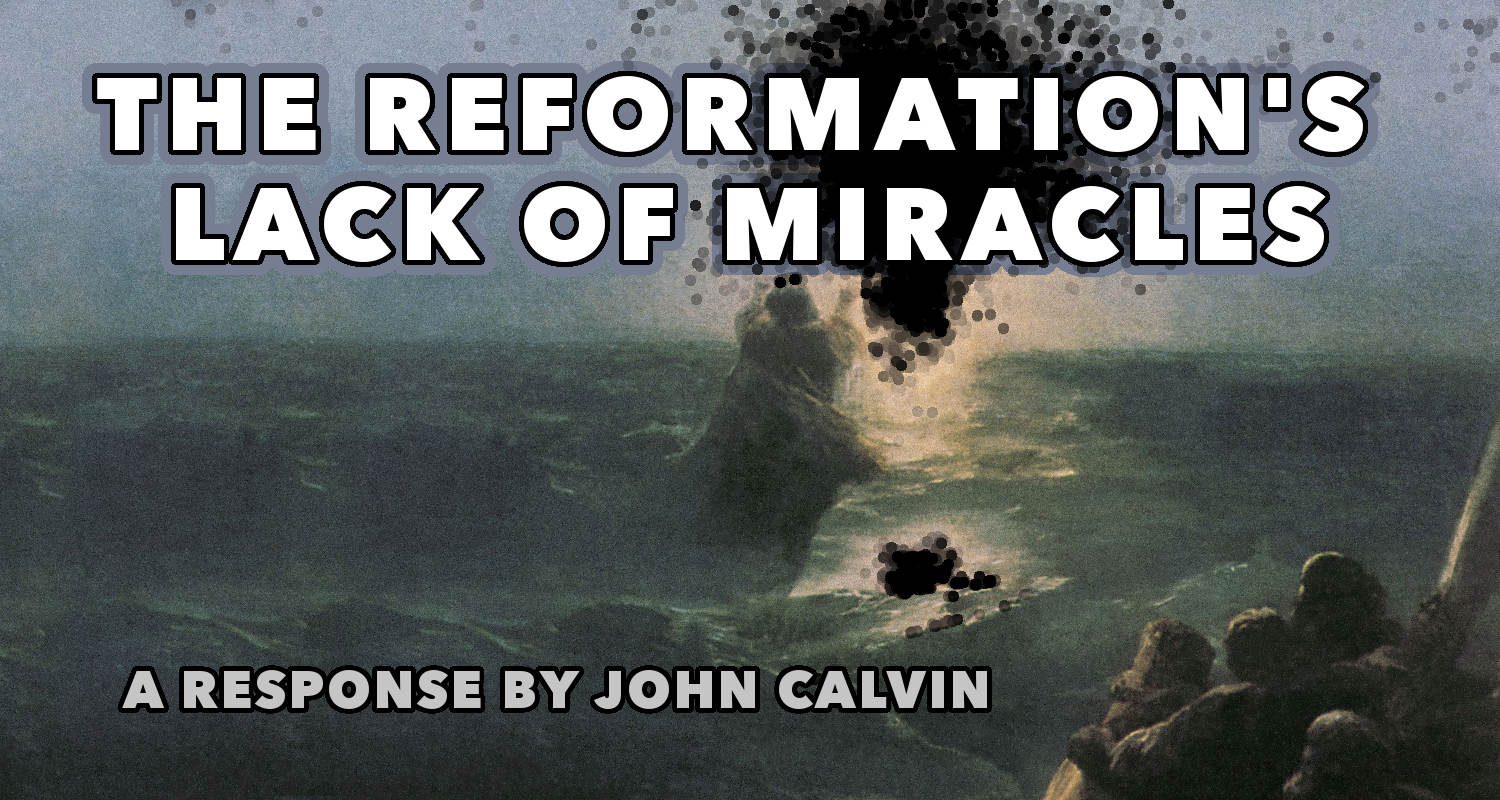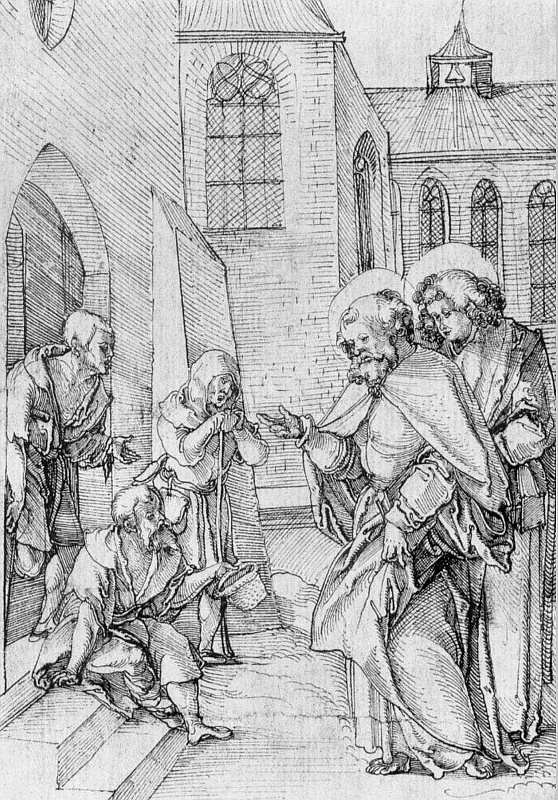 ~ Updated and Revised: February 21st, 2019 ~
~ Updated and Revised: February 21st, 2019 ~
In the "Prefatory Address to the King of France", in the opening of Institutes of the Christian Religion, John Calvin outlines the Roman Catholic objections to the Reformation, and then Calvin responses to each of them. One of the Catholic criticisms is that the Reformation lacks accompaniment of miracles, and concludes that since there is an absence of Miracles, then the Reformation is not apostolic. The question of whether Miracles happen today has been a controversial in the Protestant Church, especially after the Enlightenment.

Schäufelein Hans, "Peter and John Heal the Sick"
I've quoted John Calvin's response to the Catholic question of "Why were no miracles in the Reformation?" Calvin explains that the primary purpose of miracles was to confirm divine revelation and affirm the Church's doctrine. A miracle's immediate purpose was to heal an individual but the ultimate purpose of a miracle was to prove that the Apostolic preaching (kerygma) was true. Calvin's argument is that the Reformation is not new revelation, but a reaffirmation of the original Apostolic preaching, so no additional miracles should be expected or repeated. Calvin's counter response to the Roman Catholics questioners is that new miracles would actually suggest that the Reformation was teaching new and different things than were already revealed, and moreover the alleged miracles reported by the Roman Catholic questioners suggests that these questioners have departed from the original revelation of the New Testament and asserted new things that wasn't previous revealed, and their alleged miracles are proof that they have departed from the ancient Apostolic preaching. In classical Reformer style, Calvin equates Antichrist passages about false prophets, deceivers and magicians to the Roman Catholic list of miracles, and Calvin does so through a quote from Augustine. The fascinating ending however, is that Calvin doesn't disavow miracles entirely, but almost under his breath admits that there were miracles that had happened in the Reformation but doesn't cite any.
In addition to John Calvin's response that I've shared in this quote, I also recommend B.B. Warfield's book Counterfeit Miracles as an additional resource on this topic. The following quotation is from Henry Beveridge's translation of Calvin's Institutes, and I've quoted from it because it is in the public domain; for a more modern translation, I recommend Ford Lewis Battle's translation of Calvin's "Prefatory Address to the King of France" in his translation of the Institutes of the Christian Religion (volume 1, pp. 16-18) instead.
John Calvin writes in his "Prefatory Address to the King of France":
3. In demanding miracles from us, they act dishonestly; for we have not coined some new gospel, but retain the very one the truth of which is confirmed by all the miracles which Christ and the apostles ever wrought. But they have a peculiarity which we have not—they can confirm their faith by constant miracles down to the present day! Way rather, they allege miracles which might produce wavering in minds otherwise well disposed; they are so frivolous and ridiculous, so vain and false. But were they even exceedingly wonderful, they could have no effect against the truth of God, whose name ought to be hallowed always, and everywhere, whether by miracles, or by the natural course of events. The deception would perhaps be more specious if Scripture did not admonish us of the legitimate end and use of miracles. Mark tells us (Mark 16:20) that the signs which followed the preaching of the apostles were wrought in confirmation of it; so Luke also relates that the Lord “gave testimony to the word of his grace, and granted signs and wonders to be done” by the hands of the apostles (Acts 14:3). Very much to the same effect are those words of the apostle, that salvation by a preached gospel was confirmed, “The Lord bearing witness with signs and wonders, and with divers miracles” (Heb 2:4). Those things which we are told are seals of the gospel, shall we pervert to the subversion of the gospel? What was destined only to confirm the truth, shall we misapply to the confirmation of lies? The proper course, therefore, is, in the first instance, to ascertain and examine the doctrine which is said by the Evangelist to precede; then after it has been proved, but not till then, it may receive confirmation from miracles. But the mark of sound doctrine given by our Savior himself is its tendency to promote the glory not of men, but of God (John 7:18; 8:50). Our Savior having declared this to be test of doctrine, we are in error if we regard as miraculous, works which are used for any other purpose than to magnify the name of God. (13 No part of the passage, beginning above, “The deception,” &c., is in Ed. 1536.) And it becomes us to remember that Satan has his miracles, which, although they are tricks rather than true wonders, are still such as to delude the ignorant and unwary. Magicians and enchanters have always been famous for miracles, and miracles of an astonishing description have given support to idolatry: these, however, do not make us converts to the superstitions either of magicians or idolaters. In old times, too, the Donatists used their power of working miracles as a battering-ram, with which they shook the simplicity of the common people. We now give to our opponents the answer which Augustine then gave to the Donatists (in Joan. Tract. 23), “The Lord put us on our guard against those wonder—workers, when he foretold that false prophets would arise, who, by lying signs and divers wonders, would, if it were possible, deceive the very elect” (Mt 24:24). Paul, too, gave warning that the reign of antichrist would be “with all power, and signs, and lying wonders” (2 Thes 2:9).
But our opponents tell us that their miracles are wrought not by idols, not by sorcerers, not by false prophets, but by saints: as if we did not know it to be one of Satan’s wiles to transform himself “into an angel of light” (2 Cor. 11:14). The Egyptians, in whose neighborhood Jeremiah was buried, anciently sacrificed and paid other divine honors to him (Hieron. in Praef. Jerem). Did they not make an idolatrous abuse of the holy prophet of God? and yet, in recompense for so venerating his tomb, they thought (14 Instead of “thought they were cured,” the Ed. 1536 says simply, “they were cured” curarentur). that they were cured of the bite of serpents. What, then, shall we say but that it has been, and always will be, a most just punishment of God, to send on those who do not receive the truth in the love of it, “strong delusion, that they should believe a lie”? (2 Thess 2:11). We, then, have no lack of miracles, sure miracles, that cannot be gainsaid; but those to which our opponents lay claim are mere delusions of Satan, inasmuch as they draw off the people from the true worship of God to vanity. [1]
Sources:
1. John Calvin, trans. Henry Beveridge, Institutes of Christian Religion, "Prefatory Address to the King of France"
2. Background image is of Ivan Aivazovsky's (1817–1900) Walking on Water (source: wikipedia)



November 30th, 2017 - 06:53
I understood his final comment “We, then, have no lack of miracles, sure miracles, that cannot be gainsaid…” to refer to “all the miracles which Christ and the apostles ever wrought.” He’s making the same distinction in the first 2 sentences of the quote that he makes in the final sentence.
December 12th, 2019 - 07:38
Great post!
December 12th, 2019 - 09:43
Thanks!